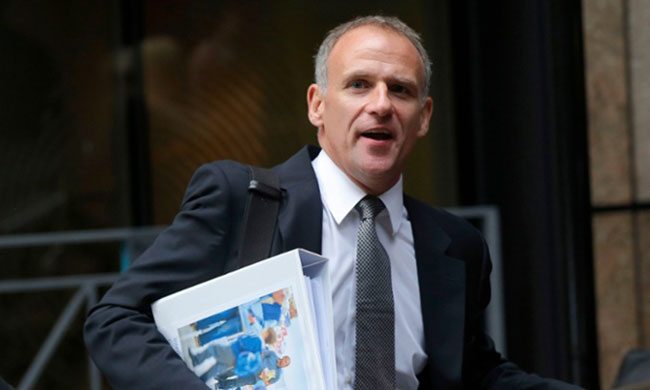The clawback provision, which will apply for up to five years, comes after Tesco was forced to pay more than £2m to its former chief executive and finance director who were ousted before last year’s £263m accounting scandal came to light.
The misstatement of profits linked to supplier payments is under investigation by the Serious Fraud Office and the accountancy watchdog, the Financial Reporting Council.
Philip Clarke, Tesco’s former chief executive, who oversaw a difficult period marked by a series of profit warnings, was paid £1.2m for loss of office. The former finance director Laurie McIlwee collected £970,880.
Tesco, which tried but failed to withhold the payments while it carried out an investigation into the accounting scandal, said it would seek to recover the payments if either was found to have been guilty of gross misconduct. “We have explicitly reserved the company’s rights to pursue recovery of these payments,” the retailer said in its annual report published on Thursday.
Lewis, who was paid a total of £4.13m for his first six months in the job including a £3.23m “golden hello”, is in line to earn up to £7.8m this year, including £6.5m in cash and share bonuses if he hits performance targets.
But Tesco said its new clawback provision would “ensure the company is able to take back awards in the event that results are materially misstated or the participant has contributed to serious reputational damage”.
Tesco told The Guardian that the awards could also be scaled back if the company, one of its business units, or executives’ conduct was linked to serious misconduct or fraud.
Tesco said it would take back annual cash bonuses for a period of up to three years after they were handed out, while long term share bonuses would remain subject to clawback for up to five years.
Last year, Lewis missed out on a bonus after the company failed to hit profit targets. In the annual report, Tesco said that, based on performance targets, Lewis should have been awarded an annual bonus worth nearly £400,000 and Stewart £187,000. Neither received the payout after Tesco’s remuneration committee “determined that a satisfactory level of profit had not been achieved”.
Nevertheless Lewis, who joined Tesco from Unilever in September last year, earned £810,000 in basic salary, pension and benefits for six months’ work – including £15,000 worth of security arrangements at his home – plus the £3.23m “golden hello” that included £525,000 in cash and £2.8m in Tesco shares to compensate him for share awards forfeited when he left his former employer.
Stewart, who joined at the end of September, earned £2.3m including £413,000 in basic salary, pension payments and benefits, including £21,000 in security measures. But his total payout amounted to £2.3m after a £1.9m “golden hello” in compensation for share awards lost when he left Marks & Spencer.
Half of Stewart’s and Lewis’s annual bonuses for this year will be based on sales performance with 30% based on profit performance and 20% on individual targets. Deanna Oppenheimer, the new chair of Tesco’s remuneration committee, consulted shareholders on the change from the company’s previous setup, which was more focused on profits. Some commentators have blamed the focus on profit above more long-term goals for Tesco’s troubles.
Oppenheimer said she would be meeting shareholders again this year to further review Tesco’s pay strategy, although she said she did not anticipate further changes.
Tesco’s move to protect itself from enforced payouts to executives came as the annual report said any legal action resulting from the SFO investigation or from a group of US shareholders who are suing over the accounting scandal “could have a material and adverse impact on the group’s financial condition”.
Last month, Tesco revealed it had crashed to the biggest loss ever recorded on the UK high street, slumping £6.4bn into the red after huge writedowns on the value of its property portfolio and stock.
Tesco has closed stores, laid off thousands of staff and completely shaken up its management team as Lewis tries to revive the fortunes of the UK’s largest retailer.


